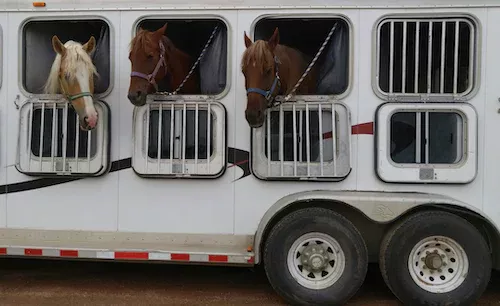Do You Need a CPH Number for Horses?
If you own or handle horses, then you may have heard of the CPH number. The CPH number is a unique identifier for horses that is used to track their movement and health records. It is important to know when to obtain a CPH number and how to use it properly.
You need a CPH number for horses. It is required to identify them and their owners. This number is a unique identifier assigned to each horse. It is used to track the animal’s movements and activities and is also necessary for the transport or sale of the horse.
Understand the importance of the CPH number and how to make sure you are using it correctly. With this guide, the process for getting a CPH number for your horse should be quick and easy.
Summary
- A CPH number is a unique identification number for horses in the UK.
- It is not a legal requirement to have a CPH number for horses but is strongly recommended for health and welfare purposes.
- CPH numbers are issued by DEFRA and are free of charge.

On this page:
You Need A CPH Number for Horses
CPH stands for "County Parish Holding" Number and is issued by the British Horse Society (BHS). A CPH number must be applied for and issued by the BHS for each horse owned in the UK. The number is a unique identifier for the horse and is used to track and record the animal's movements and health records.
The BHS issued a CPH number for horses as part of its Horses Passport Scheme which is aimed at helping to track and identify horses in the UK. The CPH number is a unique identifier for each horse and is used to identify the horse when traveling, entering competitions, or changing ownership.
The CPH number is a unique 9-digit number that is assigned to each horse and registered in its passport. This CPH number is linked to the horse's name, breed, date of birth, and other important information. This number is used to track the horse's medical history, ownership changes, and other important details.
The CPH number is a secure way for the BHS to be able to track and monitor the horse's movements, and it also helps to ensure that only properly identified horses can be used in competitions and shows. The CPH number also helps to deter horse theft and fraud, as it allows the authorities to easily identify a horse that has been stolen or tampered with.

For both entering horse events and registering horses with the British Equestrian Federation, the CPH number is necessary. It is also used for identification purposes when buying and selling horses.
The CPH number is assigned by the Animal and Plant Health Agency (APHA) in the United Kingdom and Ireland to trace the movements of animals and plants. It is designed to identify the farms and premises from which the livestock and plants originate, and where they have been transported.
This facilitates the APHA's ability to identify emerging plant or animal pests and diseases, as well as guarantee the production of food that is both safe and of high quality. For livestock trading and the export of animals and plants to foreign nations, the CPH number is also used to track the movements of these species.
CPH numbers are issued by DEFRA (Department for Environment, Food, and Rural Affairs) and are free of charge. They are typically allocated to horses that are kept in the UK, and each number is unique and identifies the horse and its owner(s).
When To Obtain A CPH Number For Horses
A CPH number should be obtained when a horse is first registered with a breed organization or when it is sold or transferred to a new owner. A CPH number is also required for any horse that is entered in a show or competition. In some cases, a CPH number is also required for insurance or other purposes.
How To Use CPH Number Properly For Horses
This list will show you how to use a CPH number properly for horses. Follow these steps, and you'll be able to use your CPH number correctly and easily.
- When registering a horse with the CPH, it is important to provide accurate and up-to-date information. This includes the horse's name, breed, gender, color, age, and markings.
- A CPH number must be assigned to the horse by the owner, breeder, or agent.
- CPH numbers are unique to each horse and must be updated when a horse changes owners.
- The CPH number must be included in any documentation related to the horse, such as registration papers and competition results.
- It is important to keep the CPH number visible on the horse at all times, especially when competing in shows or other events. This can be done by adding a tag or decal to the horse's halter.
- It is also important to ensure that the CPH number is included in any photographs taken of the horse. This will help to ensure that the horse is properly identified and associated with its owner.

How To Get A CPH Number For Horses
This list outlines the steps you will need to take to get your horse registered with the CPH and obtain the number. Here you will find information on the required documentation, the application process, and what to do once the number is issued.
1. Register with the British Equestrian Federation (BEF) and obtain a Unique Horse Identification Number (UHIN)
The BEF is the governing body for equestrian sport in the UK. To gain a CPH number for horses, riders must register with the BEF. This registration process includes providing personal and contact details, as well as details of the horse(s) being registered, such as the horse's name, age, breed, and color. The registration process also requires that the horse is microchipped and that a passport has been issued in the horse's name.
A Unique Horse Identification Number (UHIN) is required for any horse being registered with a recognized breed association, as well as for any horse that is competing in any horse event sanctioned by the United States Equestrian Federation (USEF).
2. Obtain a passport for the horse that includes the UHIN
To obtain a passport for the horse that includes the UHIN, specific details must be provided. These details include the horse’s breed, sex, color, markings, date and place of birth, microchip information, registration details, and any other relevant information that may be required.
3. Contact the Central Equine Database (CED) and complete an application form for the horse’s CPH number
The Central Equine Database (CED) is the nationwide database of horses and ponies registered with the Central Council of Physical Recreation (CCPR) in the UK. This process is necessary because the CED needs to verify the identity of the horse or pony, and the information provided on the application form must be accurate and up-to-date.
4. Include copies of the horse’s passport, registration documents, and any other relevant documents with the application form
This information is necessary for the application to be accepted and for the horse to be eligible to participate in the event. The other documents will provide evidence of any medical treatments the horse has received, the vaccinations it has had, and any other relevant information.
5. Pay the application fee
The application fee to obtain a CPH number for horses is £25. This fee is non-refundable and must be paid when the application is submitted. This fee covers the cost of processing the paperwork and registering the horse's name and details with the UK's Central Equine Database.
6. Receive the horse’s CPH number from the CED
Upon completion of the registration process, the CED will issue the horse's CPH number. The CED will provide the CPH number to the owner of the horse either in written form or electronically via email.

